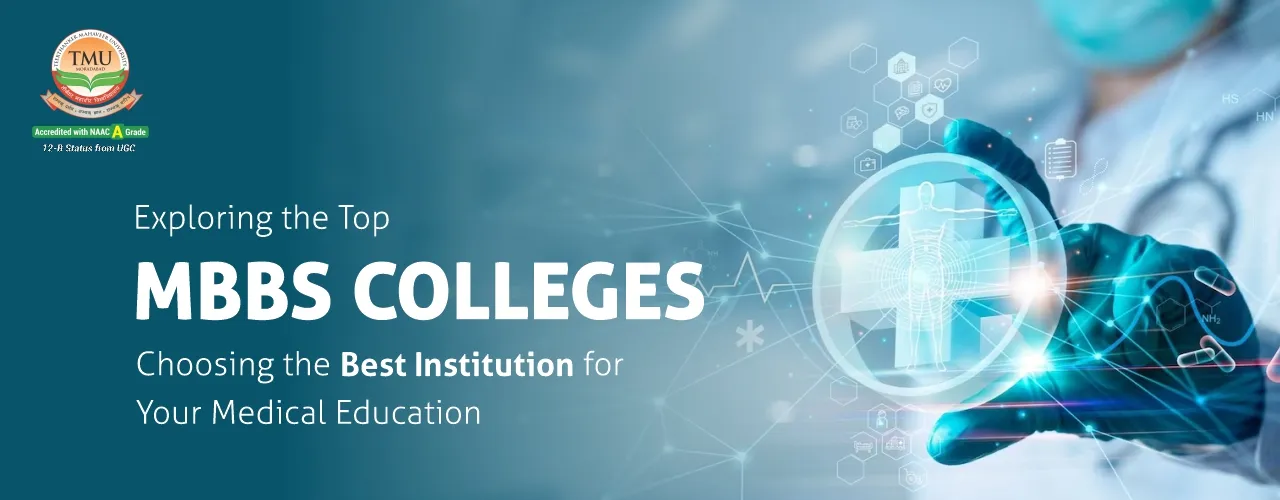Exploring the Top MBBS Colleges Choosing the Best Institution for Your Medical Education
Table of Contents
What aspects should I take into account when choosing the best MBBS college?
Several factors should be considered when searching for the best MBBS (Bachelor of Medicine, Bachelor of Surgery) college to ensure you make an informed decision. The following are some important things to take into account: accreditation and recognition, rankings and reputation, infrastructure and facilities, faculty and experience, clinical training and exposure, research opportunities, student support services, cost and financial aid, location and safety, alumni network, and placements.Teerthanker Mahaveer Medical College & Research Center at TMU, Moradabad, was founded in 2008 with approval from the Ministry of Health and Family Welfare for an admission intake of 100 MBBS students; this number was later increased to 150 starting with the academic year 2014-15.
The MBBS program at Teerthanker Mahaveer University's Medical College & Research Centre aims to provide students with quality education and training that will enable them to contribute to the growth of the health and medicine sectors. The curriculum is intended to instill in students a culture of teamwork, scientific inquiry, and lifelong learning, and the pedagogy employed includes distinct teaching/learning methods that cater to the different learning characteristics of a culturally diverse group of students, such as lectures, small group teaching, computer workshops, laboratory classes, and problem-based learning. Early exposure to patient care in a variety of health community settings and case-based learning are used to supplement the teaching process. Students have access to instruction with a strong scientific emphasis throughout the program, which helps them learn research techniques and methodologies and gain the ability to use evidence-based medical practices in their careers. The Medical Council of India (MCI) oversees the four and a half year program, which is divided into semesters. A one year internship is then required.
Teerthanker Mahaveer University
Apply for Admission
Click Here To Apply for Admission
What factors are considered when ranking MBBS colleges?
MBBS colleges are often ranked based on several criteria that assess various aspects of the institution's performance and quality. The specific criteria used for ranking can vary depending on the organization or publication. Some common criteria that are typically considered are Academic Reputation, Infrastructure and Facilities, Clinical Exposure and Training, Research Output, Faculty Quality and Student-to-Faculty Ratio, Student Quality and Admissions, Alumni Network and Placements, International Collaborations, and Recognition.It is important to keep in mind that various ranking organizations might weigh these criteria differently or take other factors into account. As a result, in order to get a complete picture of a college's ranking, it is best to look into multiple rankings and understand the specific methodology used by each organization. Furthermore, keep in mind that rankings, along with individual preferences, goals, and fit with the college, should be considered as part of the overall decision-making process.
How can I evaluate a medical school's credibility and reputation?
An MBBS (Bachelor of Medicine, Bachelor of Surgery) college's reputation and credibility must be evaluated after careful research and consideration of a variety of factors. The following actions can be taken to evaluate the standing and reliability of an MBBS college:
- Accreditation and Recognition: Determine whether the college is accredited and recognized by the appropriate medical education authorities. The Medical Council of India (MCI) accredits medical colleges in India.
- College Rankings: Look for reputable college rankings published by government agencies, educational institutions, or reputable media outlets. These rankings frequently use a variety of criteria to assess the quality and reputation of colleges.
- Alumni Network and Feedback: Contact college alumni to gather their perspectives and experiences. Alumni can provide useful information about educational quality, faculty, clinical exposure, infrastructure, and career opportunities.
- Faculty Qualifications and Expertise: Assess the faculty members' qualifications, experience, and expertise. Look for information on their educational backgrounds, contributions to research, publications, and clinical experience.
- Clinical Exposure and Hospital Collaborations: Examine the college's affiliations with well-equipped teaching hospitals. A strong affiliation with reputable hospitals indicates that students will have more clinical exposure and training opportunities.
- Research Output and Collaborations: Look into the college's research output, such as publications, patents, ongoing research projects, and collaborations with other institutions or industries.
- Placements and Alumni Success: Investigate the college's placement records. Consider alumni' career success, whether they pursued higher education or landed desirable job opportunities.
- Professional Network and Associations: Determine whether the college is affiliated with national and international professional medical associations.
- Reputation in the Medical Community: Seek advice and insights from doctors, medical professionals, and medical experts.
- Online Resources and Reviews: Gather information about the college by using online resources such as official college websites, educational forums, and review platforms.
What are the admissions requirements for the best MBBS colleges?
The admission standards for the best MBBS (Bachelor of Medicine, Bachelor of Surgery) colleges vary slightly based on the college and the country's medical education system. Academic qualifications, admission tests [the National Qualifying Cumulative Admission Test (NEET)], age limit, and citizenship or domicile are some frequent qualifying conditions. It should be noted that eligibility standards differ between colleges and nations. It is strongly advised that you thoroughly examine the admission criteria of the individual MBBS colleges in which you are interested. The official websites of the colleges, as well as the respective admission brochures or information booklets, usually provide detailed information about the eligibility criteria and admission process. It is also a good idea to keep up with official notifications and announcements from the relevant authorities or examination boards regarding any changes or updates to the eligibility requirements for entrance exams.
What is the admissions process like for top MBBS colleges?
The admission process for top MBBS (Bachelor of Medicine, Bachelor of Surgery) colleges in India is highly competitive due to the limited number of available seats and the large number of applicants. The following elements affect how competitive the admissions process is:
- Limited Seats: In comparison to the number of applicants, there are relatively few seats available in top MBBS colleges.
- Entrance Exams: In India, entrance exams like the National Eligibility cum Entrance Test (NEET) are the main criterion for admission to MBBS colleges.
- High Merit Requirements: Top MBBS colleges frequently have high merit requirements, which may include minimum required test scores and ranks.
- Reservation Quotas: Restrictions on reservations based on caste, religion, or other factors ratchet up the competition for the few open seats that remain.
- Academic Record: The admissions process takes into consideration a candidate's academic record in their higher secondary or equivalent examinations.
- Domicile and State Quotas: Some states have domicile or state-specific quotas, which reserve a specific proportion of seats for applicants from that state.
- Merit lists and counseling: Following entrance exams, candidates are typically chosen in accordance with these criteria. The ranking and counseling procedures can be extremely competitive, with candidates needing to achieve a high rank in order to be considered for admission.
What is the average length of the MBBS program at the best universities?
The average duration of the MBBS (Bachelor of Medicine, Bachelor of Surgery) program at the finest institutes in India is five and a half years. An MBBS degree typically lasts between 3-6 years. It is crucial to remember that the duration and structure of the MBBS program may differ slightly among colleges. However, the average duration of five and a half years is widely observed at many top MBBS institutes in India.
Is there an entrance exam for admission to the best MBBS colleges?
Yes, admission to the premier MBBS (Bachelor of Medicine, Bachelor of Surgery) colleges in India requires an entrance exam. The National Eligibility Cumulative Entrance Test (NEET-UG) is the most prevalent entrance exam for MBBS admissions in India. The National Testing Agency (NTA) administers the NEET-UG, a national-level entrance exam. It is a single, standardized entrance test for undergraduate medical and dentistry degrees at numerous universities across India, including MBBS and BDS (Bachelor of dentistry Surgery). It should be noted that, in addition to NEET-UG, some states and private colleges may hold their own entrance exams for MBBS admissions. NEET-UG, on the other hand, is India's most widely accepted and recognized entrance exam for MBBS admissions. Candidates are advised to check the official website of the conducting authority as well as the respective college websites on a regular basis for the most up-to-date information on entrance exams, eligibility criteria, application procedures, and important dates.
To read more such blogs, please visit: TMU Blogs.















